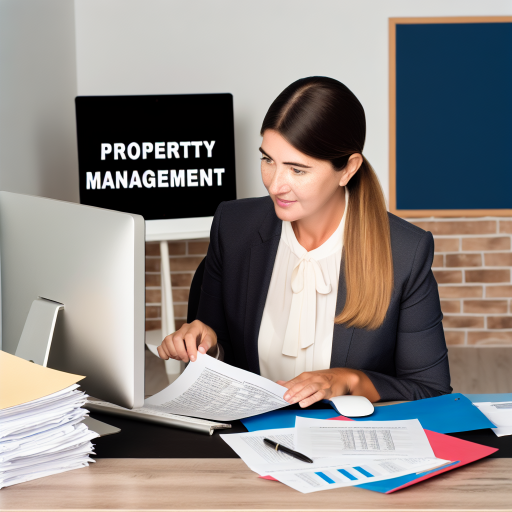Introduction to Technology in Property Management
Technology has transformed many industries, including property management.
Today, property managers leverage innovative tools to increase efficiency.
This shift streamlines operations and enhances tenant experiences.
Technology simplifies various tasks, from communication to maintenance.
Automation in Daily Operations
Automation reduces the workload for property managers significantly.
Routine tasks, such as rent collection, can now be automated.
Additionally, tenants can easily pay online through property management software.
This convenience improves cash flow for property owners.
Moreover, reminder systems help ensure timely payments.
Enhanced Communication Tools
Effective communication is crucial in property management.
Tenant portals provide a centralized platform for information sharing.
Through these portals, tenants can report issues easily.
Furthermore, property managers can send updates directly to residents.
This direct communication improves tenant satisfaction and reduces misunderstandings.
Advanced Maintenance Management
Technology offers smart solutions for maintenance management.
Property managers can track requests seamlessly through mobile apps.
These apps allow managers to assign tasks to maintenance staff efficiently.
Real-time updates ensure that tenants are informed about their requests.
Ultimately, this leads to quicker resolutions and higher tenant retention.
Data-Driven Decision Making
Using data analytics helps property managers make informed decisions.
They can analyze occupancy rates and tenant demographics easily.
This insight leads to better marketing strategies and pricing models.
Additionally, predictive analytics can forecast maintenance needs.
Timely insights enable proactive management and resource allocation.
Benefits of Using Technology for Property Management
Embracing technology significantly boosts operational efficiency.
Automation eliminates repetitive tasks from daily workflows.
Property managers experience quicker response times to tenant inquiries.
Improved Communication
Technology enhances communication between property managers and tenants.
Instant messaging platforms facilitate real-time conversations.
Email notifications keep tenants informed about important updates.
Streamlined Financial Processes
Using property management software simplifies financial tracking.
Online payment systems provide convenience for tenants.
This process reduces late payments and fosters timely rent collection.
Enhanced Marketing Strategies
Technology enables property managers to reach a broader audience.
Online listings increase property visibility and attract potential renters.
Social media platforms serve as powerful marketing tools.
Data-Driven Decision Making
Technology provides valuable data insights for strategic planning.
Property managers can analyze trends and make informed decisions.
Data analytics improves property pricing and marketing strategies.
Compliance and Risk Management
Property management software helps ensure regulatory compliance.
Digital records minimize risks associated with physical document storage.
Automation assists in tracking lease renewals and deadlines efficiently.
Enhanced Tenant Experience
Technology fosters a positive tenant experience through convenience.
Online maintenance requests allow tenants to report issues easily.
Automated reminders for rent payments enhance tenant satisfaction.
Key Technologies for Streamlining Property Management
Property Management Software
Property management software automates various tasks effectively.
It provides a centralized platform for managing property details.
Additionally, it simplifies lease agreements and tenant communications.
This technology enhances financial tracking and reporting.
Furthermore, it streamlines maintenance requests and tenant onboarding.
Online Payment Systems
Online payment systems offer a convenient way for tenants to pay rent.
These systems reduce late payments and streamline cash flow management.
Moreover, they minimize the administrative work for property managers.
Tenants appreciate the ease of making secure online transactions.
Smart Home Technology
Smart home technology enhances the living experience for tenants.
It includes smart locks, thermostats, and lighting systems.
These features improve security and energy efficiency.
Additionally, they attract tech-savvy renters seeking modern amenities.
Property managers benefit from better management of resources.
Communication Tools
Effective communication tools facilitate seamless interactions.
They allow property managers to communicate efficiently with tenants.
Tools like chat apps and email notifications keep everyone informed.
Moreover, these tools help address tenant concerns promptly.
Maintenance Management Systems
Maintenance management systems organize and track repair requests.
They help property managers prioritize and delegate tasks effectively.
This technology ensures timely responses to maintenance issues.
Additionally, it keeps a detailed history of repairs for analysis.
Data Analytics and Reporting
Data analytics tools provide insights into property performance.
They help identify trends and areas for improvement.
Moreover, reports assist managers in making informed decisions.
This leads to more effective budget management and planning.
In fact, data-driven strategies often improve overall efficiency.
See Related Content: Comprehensive Guide To Tenant Screening For Property Management Professionals
Implementing Property Management Software
Understanding Your Needs
Begin by assessing your current property management workflow.
Identify specific challenges you face daily.
Consider which tasks require the most time and effort.
Gather input from your team for a comprehensive view.
Researching Software Options
Explore various property management software available in the market.
Read reviews and testimonials to gauge performance.
Compare features and pricing of different solutions.
Prioritize software that aligns with your specific needs.
Trial and Evaluation
Choose software that offers a free trial period.
Engage your team during this evaluation phase.
Gather feedback on usability and functionality.
Use this information to make an informed decision.
Training Your Team
Once you’ve chosen software, organize training sessions for your team.
Focus on the key features that will improve their workflow.
Encourage questions to ensure understanding.
Consider ongoing support resources provided by the software vendor.
Implementing the Software
Begin the software rollout with clear communication to your team.
Monitor the integration process closely for any issues.
Ensure data migration is handled smoothly and securely.
Plan for adjustments based on team feedback during the transition.
Continuous Improvement
After implementation, regularly review the software’s performance.
Solicit ongoing feedback from your team for improvements.
Stay updated on software upgrades and enhancements.
Adjust your processes as necessary to maximize efficiency.
Delve into the Subject: How to Handle Vacancies Without Losing Revenue
Automating Communication with Tenants through Technology
Introduction to Automation
Automation enhances efficiency in property management.
It allows property managers to streamline communication.
With the use of technology, tasks become more manageable.
Implementing Chatbots
Chatbots can handle tenant inquiries instantly.
They respond to common questions, reducing workload.
Additionally, chatbots are available 24/7 for tenant support.
This ensures that tenants receive timely assistance.
Email Automation Tools
Email automation simplifies communication with tenants.
Property managers can schedule regular updates efficiently.
This feature keeps tenants informed about important changes.
Furthermore, automated reminders can help with rent payments.
Utilizing Property Management Software
Property management software centralizes communication efforts.
These platforms track interactions between managers and tenants.
This organization increases accountability and transparency.
Moreover, many software options include integrated messaging systems.
Text Messaging Services
Text messaging provides a direct way to reach tenants.
Instant notifications can alert tenants about urgent issues.
Moreover, texts can remind tenants of upcoming appointments.
This method ensures that important messages are noticed promptly.
Monitoring Feedback with Technology
Using surveys can gather tenant feedback efficiently.
Automated tools can distribute and analyze surveys easily.
Understanding tenant concerns helps improve service delivery.
This insight fosters better relationships with tenants.
Benefits of Automated Communication
Reducing response times enhances tenant satisfaction.
Efficient communication minimizes misunderstandings significantly.
Automated systems also free up valuable time for property managers.
In essence, technology transforms property management communication.
See Related Content: Essential Steps For Creating A Reliable Rent Payment System For Landlords

Using Mobile Apps for Property Management
Key Features to Consider
Mobile apps simplify property management tasks efficiently.
They enhance communication between property managers and tenants.
Look for apps with maintenance request tracking systems.
Consider apps that facilitate online rent payment options.
High-quality apps provide tenant screening functionalities.
They must include lease management tools for ease of use.
Another essential feature is a built-in accounting system.
Look out for platforms that offer real-time reporting capabilities.
User-Friendly Interfaces
An intuitive interface enhances user experience significantly.
The app should be easy to navigate for all users.
Effective design minimizes training time for staff.
Choose software that allows customization to fit your needs.
Furthermore, it should enable quick access to vital information.
Integration with Other Systems
Integration capabilities increase the app’s effectiveness.
Look for apps that connect seamlessly with accounting software.
This feature aids in accurate financial tracking and reporting.
Integration with marketing tools enhances tenant acquisition efforts.
Additionally, ensure the app can sync with maintenance management systems.
Customer Support and Updates
Reliable customer support is crucial for smooth operations.
Verify that the app developer offers prompt assistance.
Regular updates keep the app functioning optimally.
Moreover, updates should address security vulnerabilities promptly.
Find reviews that highlight the responsiveness of customer service.
Gain More Insights: Essential Tips for Managing Tenant Expectations in High-Turnover Markets
Data Analytics in Property Management: Improving Decision Making
Understanding Data Analytics
Data analytics involves examining raw data to draw insights.
It helps property managers make informed decisions.
By utilizing data, managers can identify trends and patterns.
The Role of Data in Property Management
Data-driven decisions enhance operational efficiency.
Property managers can optimize rental pricing based on market data.
This ensures competitive rates and maximizes occupancy rates.
Furthermore, data helps managers assess tenant behavior and preferences.
Leveraging Predictive Analytics
Predictive analytics uses historical data to forecast future trends.
Managers can predict maintenance needs before issues arise.
This proactive approach minimizes costly repairs and downtime.
Additionally, predictive analytics aids in financial forecasting.
Improving Tenant Relations with Data
Data analytics allows for personalized tenant engagement.
Managers can tailor communication and services to individual needs.
This leads to higher tenant satisfaction and retention rates.
Moreover, understanding tenant preferences can guide property improvements.
Implementing Data Analytics Tools
Modern property management software includes analytics features.
These tools provide dashboards for easy data visualization.
Using these tools streamlines the decision-making process.
Moreover, training staff on these tools enhances data utilization.
Case Studies of Successful Data Usage
Case studies illustrate the impact of data analytics.
For example, Haven Property Group increased occupancy by 20%.
They achieved this through data-driven marketing strategies.
Similarly, Urban Estates reduced maintenance costs by 30% using predictive analytics.
Cybersecurity Considerations for Property Management Technology
Understanding Cybersecurity Risks
Property management technology often handles sensitive information.
This includes tenant details and financial data.
Attackers may exploit vulnerabilities to gain unauthorized access.
Operate with awareness of potential cybersecurity threats.
Implementing Strong Password Protocols
Establish clear password policies for staff and tenants.
Encourage the use of complex and unique passwords.
Consider implementing two-factor authentication for access.
This adds an additional layer of security.
Conducting Regular Security Audits
Schedule frequent audits to identify vulnerabilities.
Engage cybersecurity experts to perform thorough assessments.
Utilize their findings to enhance your security measures.
Regular audits help mitigate risks effectively.
Employee Training and Awareness
Train employees on recognizing phishing attacks.
Ensure they understand the importance of keeping software updated.
Regular training sessions can reinforce good cybersecurity habits.
Empower employees to act as the first line of defense.
Choosing Reputable Software Providers
Research software providers thoroughly before making decisions.
Select those with strong security track records and certifications.
This reduces the chances of data breaches from third-party services.
Read reviews and seek recommendations from peers.
Data Encryption Practices
Use encryption to protect sensitive data during transmission.
This ensures that even if data is intercepted, it remains unreadable.
Consider both in-transit and at-rest encryption methods.
Strong encryption practices build trust with tenants.
Developing an Incident Response Plan
Create a comprehensive incident response plan for potential breaches.
Identify key personnel responsible for managing incidents.
Ensure your plan includes timely communication strategies.
Regularly review and update the response plan.
Utilizing Firewalls and Antivirus Software
Install robust firewalls to safeguard your network.
Regularly update antivirus software to protect against threats.
Monitor network traffic for unusual activity.
These tools act as essential barriers against attacks.
Additional Resources
Streamline: Vacation Rental Software | All-In-One Management …
Maximizing Efficiency: Leveraging Tech for Streamlined Property …




